A Comprehensive Report on Entrepreneurship: Theory and Practice
VerifiedAdded on 2023/01/05
|9
|949
|54
Report
AI Summary
This report provides a comprehensive overview of entrepreneurship, beginning with an introduction that defines the concept and highlights its significance in business development. The report then delves into entrepreneurship theory, focusing on innovation and its role in generating profit. It examines the characteristics of successful entrepreneurs, such as creativity, passion, and motivation, using Jeff Bezos as an example. The report also discusses the motivation behind becoming an entrepreneur and the factors that drive individuals to pursue their own ventures. The conclusion summarizes the key takeaways, emphasizing the importance of a strong vision, passion, and effective strategies for achieving maximum profit. References include academic sources on entrepreneurship and its various aspects.

ENTREPRENUERSHIP
Paraphrase This Document
Need a fresh take? Get an instant paraphrase of this document with our AI Paraphraser
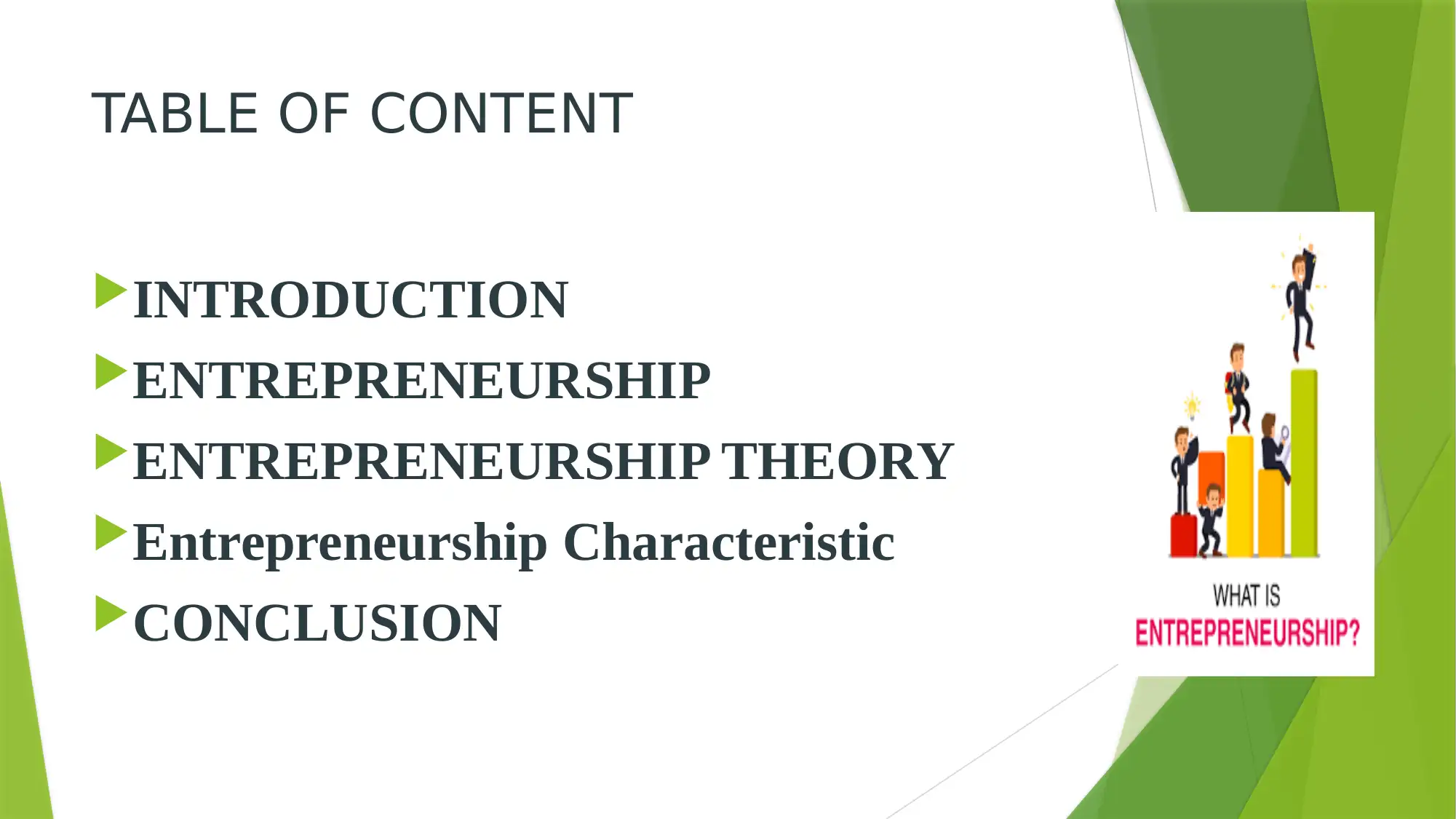
TABLE OF CONTENT
INTRODUCTION
ENTREPRENEURSHIP
ENTREPRENEURSHIP THEORY
Entrepreneurship Characteristic
CONCLUSION
INTRODUCTION
ENTREPRENEURSHIP
ENTREPRENEURSHIP THEORY
Entrepreneurship Characteristic
CONCLUSION
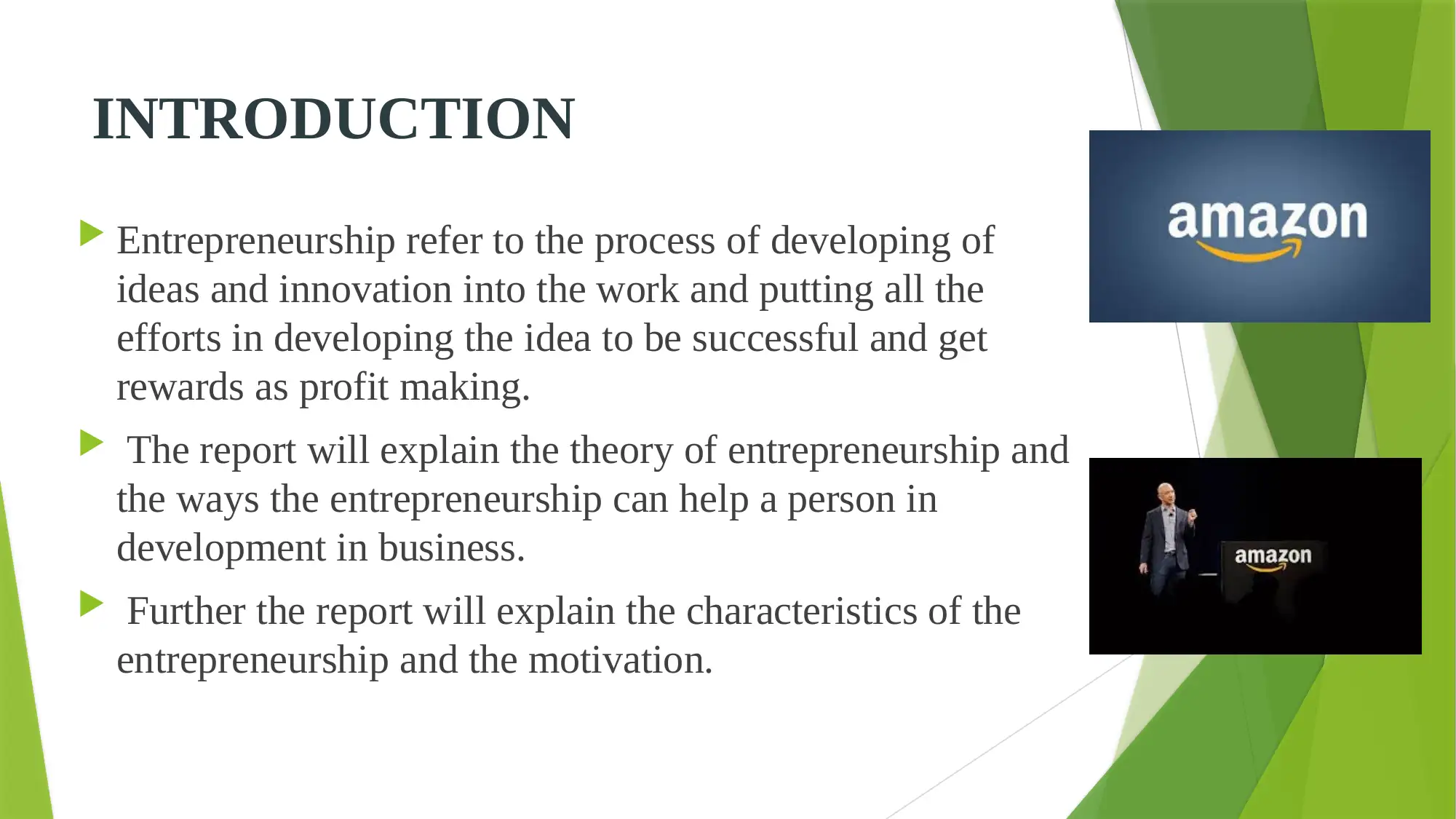
INTRODUCTION
Entrepreneurship refer to the process of developing of
ideas and innovation into the work and putting all the
efforts in developing the idea to be successful and get
rewards as profit making.
The report will explain the theory of entrepreneurship and
the ways the entrepreneurship can help a person in
development in business.
Further the report will explain the characteristics of the
entrepreneurship and the motivation.
Entrepreneurship refer to the process of developing of
ideas and innovation into the work and putting all the
efforts in developing the idea to be successful and get
rewards as profit making.
The report will explain the theory of entrepreneurship and
the ways the entrepreneurship can help a person in
development in business.
Further the report will explain the characteristics of the
entrepreneurship and the motivation.
⊘ This is a preview!⊘
Do you want full access?
Subscribe today to unlock all pages.

Trusted by 1+ million students worldwide
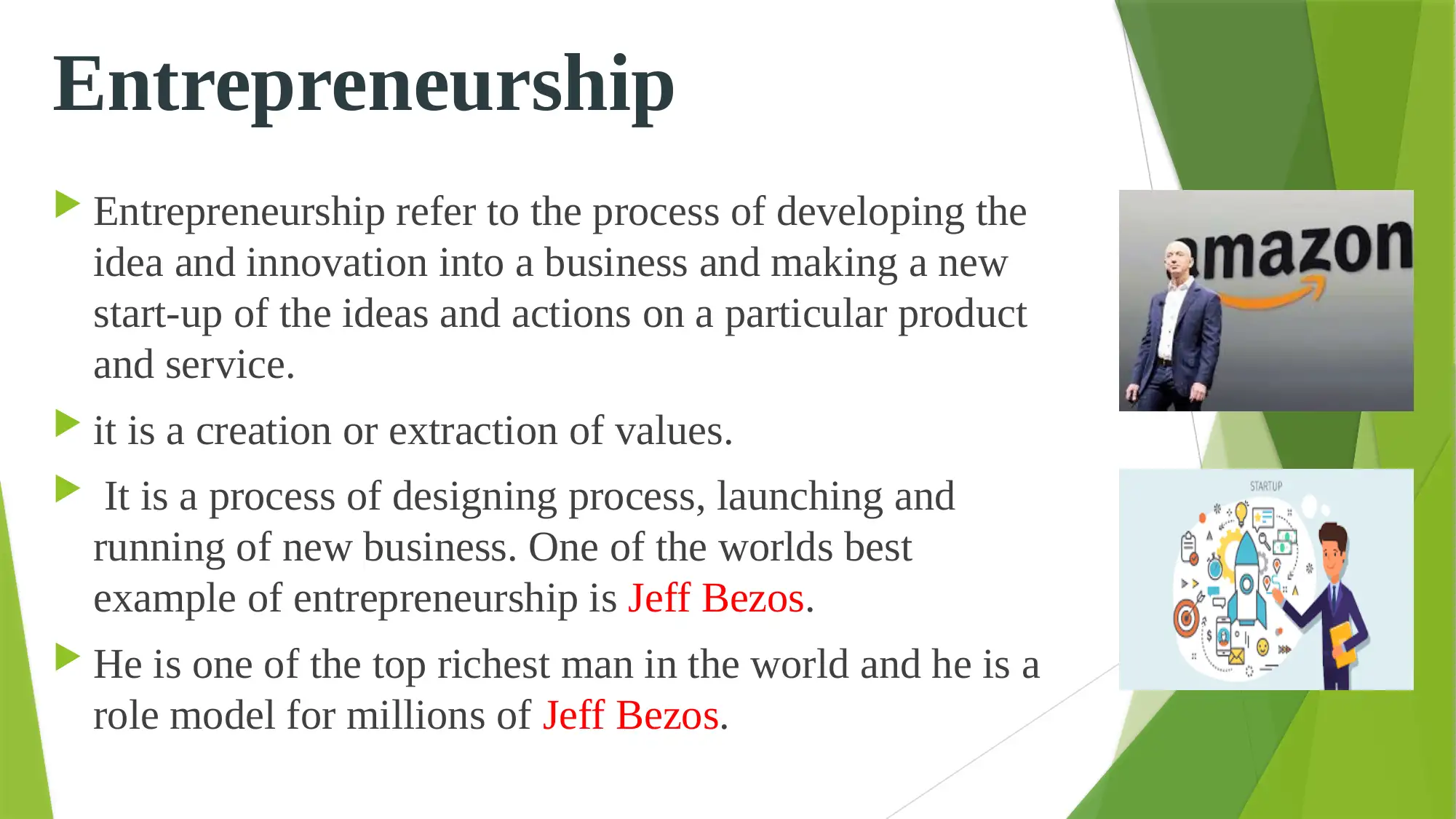
Entrepreneurship
Entrepreneurship refer to the process of developing the
idea and innovation into a business and making a new
start-up of the ideas and actions on a particular product
and service.
it is a creation or extraction of values.
It is a process of designing process, launching and
running of new business. One of the worlds best
example of entrepreneurship is Jeff Bezos.
He is one of the top richest man in the world and he is a
role model for millions of Jeff Bezos.
Entrepreneurship refer to the process of developing the
idea and innovation into a business and making a new
start-up of the ideas and actions on a particular product
and service.
it is a creation or extraction of values.
It is a process of designing process, launching and
running of new business. One of the worlds best
example of entrepreneurship is Jeff Bezos.
He is one of the top richest man in the world and he is a
role model for millions of Jeff Bezos.
Paraphrase This Document
Need a fresh take? Get an instant paraphrase of this document with our AI Paraphraser

Entrepreneurship theory: -
Entrepreneurship theory refer to the theory explaining the importance and the ways to make
things better in the entrepreneurship. Theories of entrepreneurship focus on the three major
factor, nature of the opportunities, the nature of entrepreneur and the nature of decision-
making framework where the entrepreneur functions.
Innovation Theory of Entrepreneurship the theory of profit is proposed by Joseph. Joseph
believe that every entrepreneur can earn good profit and economic profit by introducing
successful innovation. The main function of the theory is to explain that entrepreneur function
is to earn more profit with the innovation and introduction of innovation in profit making.
The rewards which cam out of the innovation is the profit and that is for which the theory
explain. The innovation theory of profit posits the gains of profit and innovation is successful
in the cost of production and increasing of profit for product.
Jeff Bezos born in 1964 January 12th. Is an American internet entrepreneur industrialist, he is
one of the best know CEO founder and is president of multinational company Amazon.
Entrepreneurship theory refer to the theory explaining the importance and the ways to make
things better in the entrepreneurship. Theories of entrepreneurship focus on the three major
factor, nature of the opportunities, the nature of entrepreneur and the nature of decision-
making framework where the entrepreneur functions.
Innovation Theory of Entrepreneurship the theory of profit is proposed by Joseph. Joseph
believe that every entrepreneur can earn good profit and economic profit by introducing
successful innovation. The main function of the theory is to explain that entrepreneur function
is to earn more profit with the innovation and introduction of innovation in profit making.
The rewards which cam out of the innovation is the profit and that is for which the theory
explain. The innovation theory of profit posits the gains of profit and innovation is successful
in the cost of production and increasing of profit for product.
Jeff Bezos born in 1964 January 12th. Is an American internet entrepreneur industrialist, he is
one of the best know CEO founder and is president of multinational company Amazon.
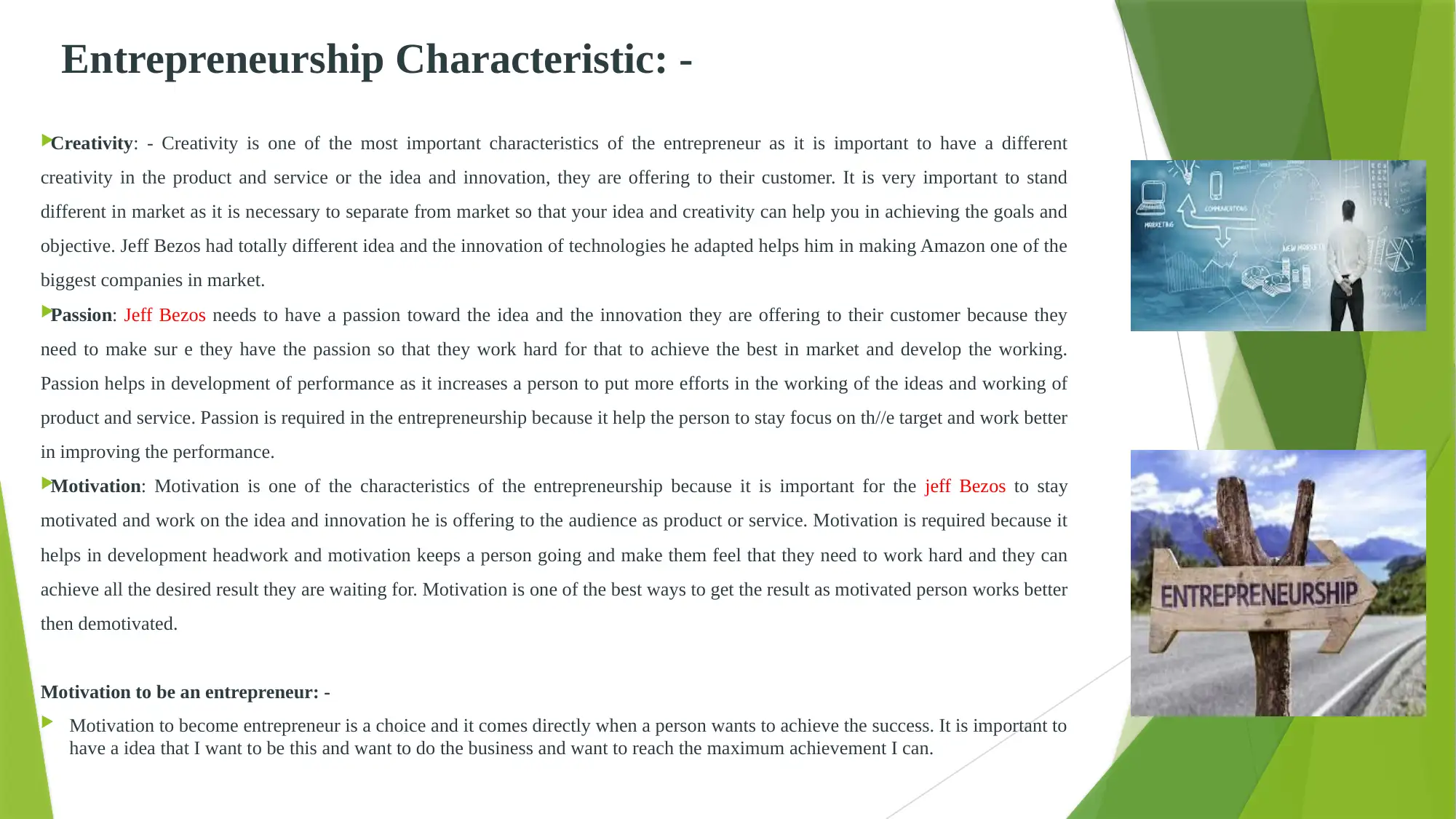
Entrepreneurship Characteristic: -
Creativity: - Creativity is one of the most important characteristics of the entrepreneur as it is important to have a different
creativity in the product and service or the idea and innovation, they are offering to their customer. It is very important to stand
different in market as it is necessary to separate from market so that your idea and creativity can help you in achieving the goals and
objective. Jeff Bezos had totally different idea and the innovation of technologies he adapted helps him in making Amazon one of the
biggest companies in market.
Passion: Jeff Bezos needs to have a passion toward the idea and the innovation they are offering to their customer because they
need to make sur e they have the passion so that they work hard for that to achieve the best in market and develop the working.
Passion helps in development of performance as it increases a person to put more efforts in the working of the ideas and working of
product and service. Passion is required in the entrepreneurship because it help the person to stay focus on th//e target and work better
in improving the performance.
Motivation: Motivation is one of the characteristics of the entrepreneurship because it is important for the jeff Bezos to stay
motivated and work on the idea and innovation he is offering to the audience as product or service. Motivation is required because it
helps in development headwork and motivation keeps a person going and make them feel that they need to work hard and they can
achieve all the desired result they are waiting for. Motivation is one of the best ways to get the result as motivated person works better
then demotivated.
Motivation to be an entrepreneur: -
Motivation to become entrepreneur is a choice and it comes directly when a person wants to achieve the success. It is important to
have a idea that I want to be this and want to do the business and want to reach the maximum achievement I can.
Creativity: - Creativity is one of the most important characteristics of the entrepreneur as it is important to have a different
creativity in the product and service or the idea and innovation, they are offering to their customer. It is very important to stand
different in market as it is necessary to separate from market so that your idea and creativity can help you in achieving the goals and
objective. Jeff Bezos had totally different idea and the innovation of technologies he adapted helps him in making Amazon one of the
biggest companies in market.
Passion: Jeff Bezos needs to have a passion toward the idea and the innovation they are offering to their customer because they
need to make sur e they have the passion so that they work hard for that to achieve the best in market and develop the working.
Passion helps in development of performance as it increases a person to put more efforts in the working of the ideas and working of
product and service. Passion is required in the entrepreneurship because it help the person to stay focus on th//e target and work better
in improving the performance.
Motivation: Motivation is one of the characteristics of the entrepreneurship because it is important for the jeff Bezos to stay
motivated and work on the idea and innovation he is offering to the audience as product or service. Motivation is required because it
helps in development headwork and motivation keeps a person going and make them feel that they need to work hard and they can
achieve all the desired result they are waiting for. Motivation is one of the best ways to get the result as motivated person works better
then demotivated.
Motivation to be an entrepreneur: -
Motivation to become entrepreneur is a choice and it comes directly when a person wants to achieve the success. It is important to
have a idea that I want to be this and want to do the business and want to reach the maximum achievement I can.
⊘ This is a preview!⊘
Do you want full access?
Subscribe today to unlock all pages.

Trusted by 1+ million students worldwide
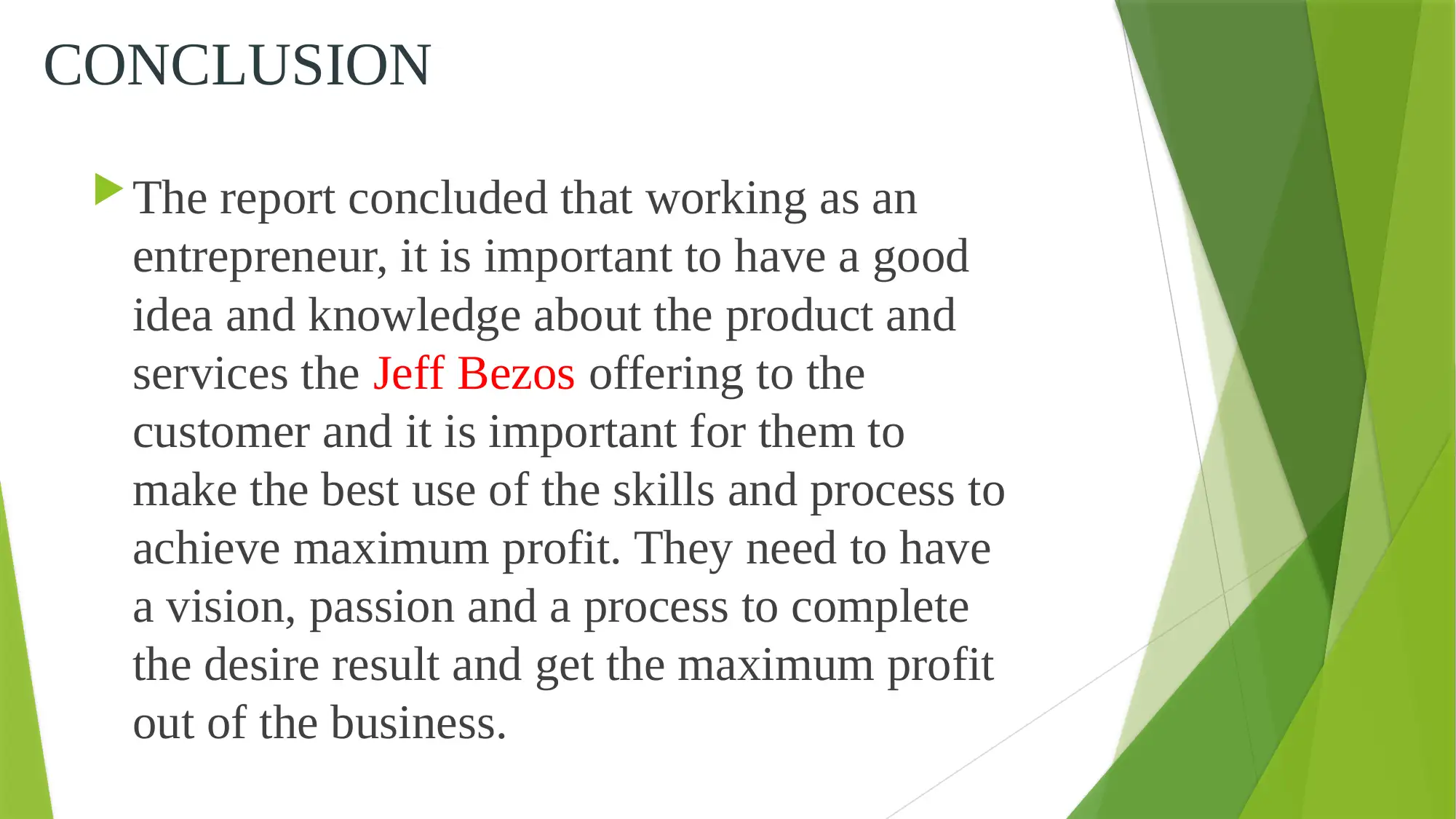
CONCLUSION
The report concluded that working as an
entrepreneur, it is important to have a good
idea and knowledge about the product and
services the Jeff Bezos offering to the
customer and it is important for them to
make the best use of the skills and process to
achieve maximum profit. They need to have
a vision, passion and a process to complete
the desire result and get the maximum profit
out of the business.
The report concluded that working as an
entrepreneur, it is important to have a good
idea and knowledge about the product and
services the Jeff Bezos offering to the
customer and it is important for them to
make the best use of the skills and process to
achieve maximum profit. They need to have
a vision, passion and a process to complete
the desire result and get the maximum profit
out of the business.
Paraphrase This Document
Need a fresh take? Get an instant paraphrase of this document with our AI Paraphraser
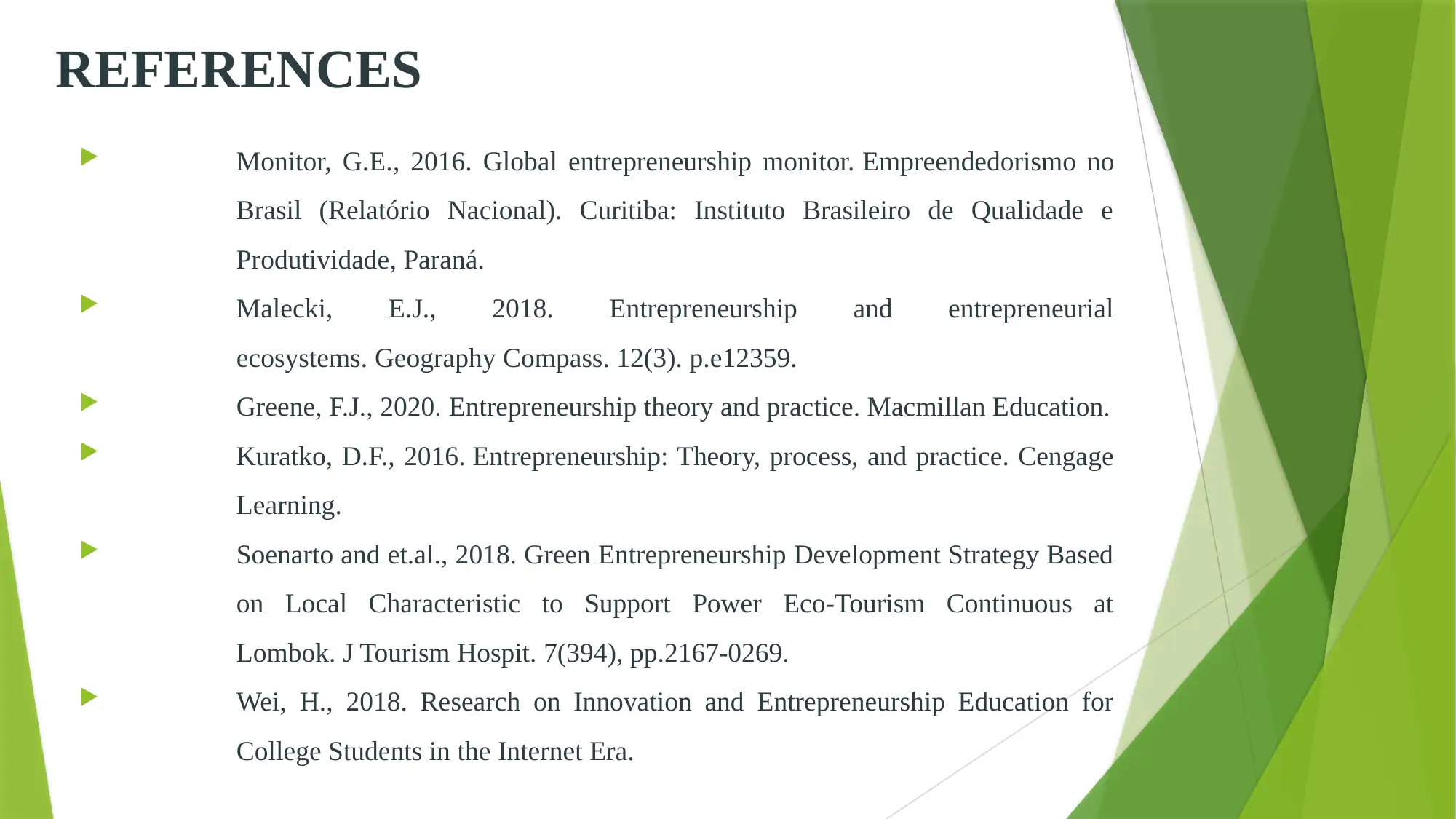
REFERENCES
Monitor, G.E., 2016. Global entrepreneurship monitor. Empreendedorismo no
Brasil (Relatório Nacional). Curitiba: Instituto Brasileiro de Qualidade e
Produtividade, Paraná.
Malecki, E.J., 2018. Entrepreneurship and entrepreneurial
ecosystems. Geography Compass. 12(3). p.e12359.
Greene, F.J., 2020. Entrepreneurship theory and practice. Macmillan Education.
Kuratko, D.F., 2016. Entrepreneurship: Theory, process, and practice. Cengage
Learning.
Soenarto and et.al., 2018. Green Entrepreneurship Development Strategy Based
on Local Characteristic to Support Power Eco-Tourism Continuous at
Lombok. J Tourism Hospit. 7(394), pp.2167-0269.
Wei, H., 2018. Research on Innovation and Entrepreneurship Education for
College Students in the Internet Era.
Monitor, G.E., 2016. Global entrepreneurship monitor. Empreendedorismo no
Brasil (Relatório Nacional). Curitiba: Instituto Brasileiro de Qualidade e
Produtividade, Paraná.
Malecki, E.J., 2018. Entrepreneurship and entrepreneurial
ecosystems. Geography Compass. 12(3). p.e12359.
Greene, F.J., 2020. Entrepreneurship theory and practice. Macmillan Education.
Kuratko, D.F., 2016. Entrepreneurship: Theory, process, and practice. Cengage
Learning.
Soenarto and et.al., 2018. Green Entrepreneurship Development Strategy Based
on Local Characteristic to Support Power Eco-Tourism Continuous at
Lombok. J Tourism Hospit. 7(394), pp.2167-0269.
Wei, H., 2018. Research on Innovation and Entrepreneurship Education for
College Students in the Internet Era.

⊘ This is a preview!⊘
Do you want full access?
Subscribe today to unlock all pages.

Trusted by 1+ million students worldwide
1 out of 9
Related Documents
Your All-in-One AI-Powered Toolkit for Academic Success.
+13062052269
info@desklib.com
Available 24*7 on WhatsApp / Email
![[object Object]](/_next/static/media/star-bottom.7253800d.svg)
Unlock your academic potential
Copyright © 2020–2025 A2Z Services. All Rights Reserved. Developed and managed by ZUCOL.





